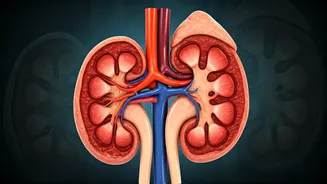Kidney Health Risks
According to a heart surgeon, there are several everyday actions that people unknowingly engage in that pose a threat to kidney health. It's crucial to be
aware of these risks to take preventive measures and maintain overall well-being. This information, provided by a medical professional, underscores the need for proactive health management. Understanding these risks empowers individuals to make informed decisions about their daily routines, ultimately contributing to a healthier lifestyle and reducing the likelihood of kidney problems. Paying attention to these habits can significantly improve long-term health.
Excessive Salt Intake
One of the key things the heart surgeon warns about is the excessive intake of salt. Eating too much salt can increase blood pressure, which, in turn, puts a strain on the kidneys. Over time, high blood pressure can damage the delicate filtering units of the kidneys, known as nephrons. Limiting sodium consumption is therefore a key aspect of protecting kidney function. This means being mindful of processed foods, fast foods, and adding less salt to meals at home. By making this simple adjustment, you can reduce the load on your kidneys and help them function properly for a longer time.
Frequent Painkillers
The second major risk factor the surgeon points out is the overuse of painkillers, especially nonsteroidal anti-inflammatory drugs (NSAIDs) like ibuprofen or naproxen. While these medications can effectively relieve pain, long-term use can negatively affect kidney function. NSAIDs reduce blood flow to the kidneys, and chronic use may result in kidney damage. It's important to use these medications as directed and avoid exceeding the recommended dosage. If you require painkillers frequently, consulting a doctor to find alternative pain management strategies is crucial to protecting your kidneys from potential harm.
Not Drinking Enough
Insufficient water intake is another significant risk. When the body is dehydrated, the kidneys struggle to eliminate waste products effectively. Dehydration can lead to a buildup of toxins, placing increased stress on the kidneys. Drinking an adequate amount of water throughout the day helps the kidneys flush out waste and maintain optimal function. This is especially important for those living in hotter climates or engaging in physical activities. Aim for consistent hydration to support your kidneys and overall health.
Excessive Alcohol Use
Excessive alcohol consumption can significantly harm the kidneys. Alcohol can disrupt the kidneys' function and also increase blood pressure, which further impacts kidney health. Regularly consuming large amounts of alcohol can lead to chronic kidney disease and other serious health issues. Moderation is key. Sticking within the recommended alcohol intake limits helps to reduce the risk of kidney damage and protects overall health. Being mindful of your alcohol consumption can greatly contribute to kidney health.
High Red Meat Intake
The surgeon also highlights the potential risks of consuming large amounts of red meat. A diet high in red meat can increase the risk of kidney stones due to the high levels of purines, which break down into uric acid. High uric acid levels can lead to stone formation in the kidneys. Limiting red meat consumption and balancing your diet with plenty of fruits, vegetables, and whole grains is advisable to reduce this risk. This balanced approach supports overall health and minimizes the strain on your kidneys, aiding in their smooth functioning.













